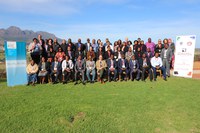The 2nd African School on Decentralisation (ASD) 2022
The 2nd edition of the African School on Decentralisation (ASD) was held in-person between 30th May and 10th June 2022 in South Africa. The first week of the course took place in the Stellenbosch area with the School winding up its second week in the Cape Town CBD.
The course focused on “Good Governance in African Cities” which referred, first, to appropriate policies to advance the wellbeing of cities and, secondly, the effectiveness and integrity of the city structures and means of pursuing those policies.
Course content, delivery & activities
To address the issues arising from the above theme, the course adopted daily sub-themes focused on: the context and challenges affecting cities domestically, regionally, and globally; how the cities are structured and empowered to meet these challenges; how their financing and financial management capacitates them to deliver on their mandates; and what the major governance issues are as they relate to environmental sustainability, climate change, gendered and safer cities. These were covered in the first week with the second week pivoting on the general questions to guide discussions through the examination of case studies of key African cities.
The opening address on the first day of the School was made open to the public as a Webinar. Members of the public registered and followed the address and discussions emerging form the address virtually.
The course then adopted a combination of expert presentations, plenary discussions based on the presentations, group discussions amongst the participants, individual report-back sessions by representatives of the groups, site visits as well as focused case studies of select cities in Africa.
The School also incorporated social networking events such as a welcome cocktail, an excursion to Robben Island, a pub quiz held in the second week as well as a farewell dinner at the end of the School.
Participation in the 2022 edition
The School targeted government officials at both the national and subnational (city) level as well as academic researchers and members from civil society organisation working in the area of decentralised governance in African countries.
The 2022 course received a total of 346 applications drawn from 32 African countries and 3 countries outside Africa. Out of these, a total of 25 participants were selected, each representing a different African country, to be part of the 2022 course.
Of the 25 participants that attended the School, 59% were female with male participants constituting 41%. Of this total number, as well, 31% came from national government institutions, 17% from city/local/regional government institutions, 24% from academia, 17% from international/inter-governmental organisations, 17% from civil society organisations while 3% represented individuals from the private sector.
In addition to the 25 participants, the 2022 edition of the School received a delegation of 3 participants from the Kenyan Senate and a councillor from the City of Cape Town.
A critical part of this year’s programme was the involvement of city leaders from across Africa who form part of the Commonwealth Sustainable Cities Network (CSCN). Through our funding partner, the Commonwealth Local Government Forum (CLGF) we invited and hosted city leaders from various African cities who took part in the School through two panel discussions that took place in the first two days of the School. These included the Mayors of Lusaka (Zambia), Wum (Cameroon), Manzini (Eswatini) as well as the Municipal Chief Executive of Adenta (Ghana) who spoke on the challenges facing local governance in their cities and Africa at large, on the first day. For the second day’s panel, the mayors of Windhoek (Namibia) and Bulawayo (Zimbabwe) as well as the IDP Manager of eThekwini Municipality and the Secretary General of the East African Local Government Association, spoke to the participants about the CSCN network’s priorities for the future as well as on sustainable urbanisation. The participants got a chance to interact with these city leaders through plenary discussions that followed each of the panels and also socially during the welcome cocktail arranged on the evening of the first day. The participation of these city leaders was crucial in providing practical contexts for the presentations, discussions and deliberations that were to follow for the next days of the School.
Evaluations and feedback
Two separate evaluation surveys of the School were administered at the end of the course through which the participants gave independent and anonymized feedback on the course generally and on their experience.
From the first survey, 83% of the participants totally agreed that the topics covered in the course were relevant to their work/studies or projects. 89% totally agreed that they had gained new insights during the course while 79% totally agreed that they would apply the newly gained insights in their work/studies/projects. Participants also went a step further to detail the specific ways in which they intended to apply the newly gained insights in their respective work.
From the second survey which focused on the organisation of the course as well as the technical aspects of the course content and delivery, 70.4% of the participants generally assessed the course and the quality of its lecturers as being excellent with 25.9% assessing it and the lecturers as being very good. Through the internal survey as well, participants got an opportunity to make proposals relating to the subjects they would like to be covered in future editions of the School, the aspects of the course they did not like as well as proposals relating to alumni activities they would like to take part in going forward.
Click here to view the photo gallery of the 2nd African School on Decentralisation

